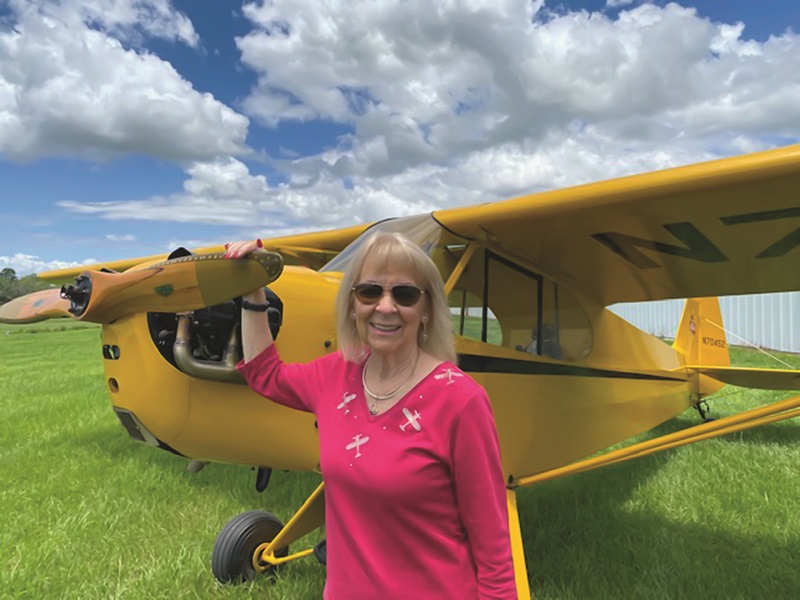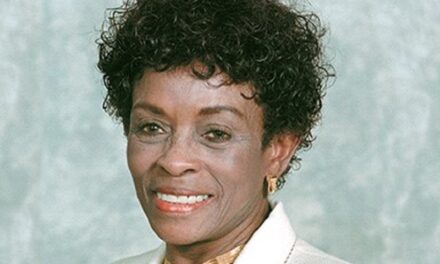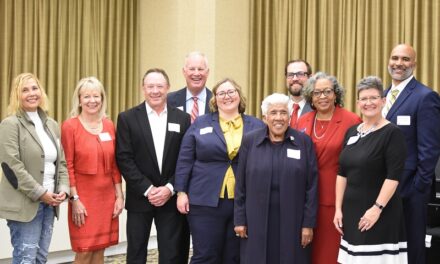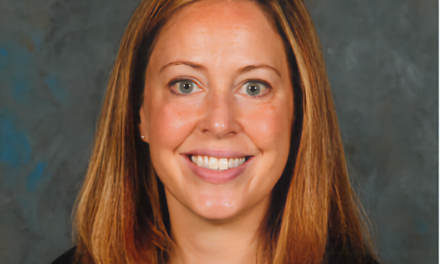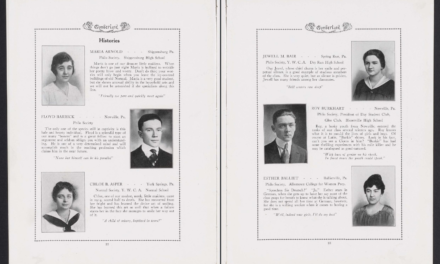This story first appeared in the Shippensburg University Magazine.
Encouraging students to soar high—literally and figuratively—is a key to student success for Barbara (King) Walters-Phillips ’71.
She has inspired thousands of students and teachers nationwide with her aeronautics workshops, classes, and “first flight” experiences over the past three decades. Her work and enthusiasm recently led her to be honored by the National Aeronautic Association (NAA) with its 2019 Katharine Wright Trophy.
As a licensed private pilot and a teacher whose career spanned nearly four decades, Walters-Phillips continually searched for ways to incorporate her love of flying into the classroom. “I’ve always been around aviation,” she said. Her dad was a private pilot and owned a Cessna 172.
“Flying was a novelty back then, and he loved sharing that with people. If our neighbors expressed interest in flying, he would take them. He gave so many people their first airplane ride.”
Walters-Phillips frequently accompanied her dad on flights. Sometimes, he would even fly to a small airport near campus and transport her home to Mifflintown for weekends during college.
Flying is a passion she shares with her husband, retired US Air Force pilot Lt. Col. Patrick Phillips. In fact, the couple spent twelve years restoring their own Piper J-3 Cub and have traveled the country in it. “We would often meet at the airport on Fridays after work and fly off to an air show.”
Walters-Phillips began her career teaching fifth grade in Hagerstown, Maryland. In 1986, she attended the National Congress on Aviation and Space Education. The decision charted a new life course for her. “I fell in love with what I learned, and the excitement has never left.”
Walters-Phillips immediately saw the potential in using aviation to motivate and teach students, particularly in math and science. She obtained a grant to start Aviation Invasion, an aerospace workshop designed to motivate middle school girls to study math and science. A family friend allowed them to use her family’s private hangar at a nearby airport for the course.
“They came ready to learn,” Walters-Phillips said. “Their enthusiasm inspired me.”
She taught the program for two years before relocating to Florida with her husband in 1992. Here, she continued to teach the aviation course at an Orlando airport. The program caught the attention of the local Experimental Aircraft Association (EAA) chapter, who recruited Walters-Phillips to write curriculum for the Orlando Youth Aviation Center classes.
The eight-week course, open to all students in grades 7 to 12, includes an introduction to aeronautics, lessons in meteorology and flight instruments, with a focus on aviation-related careers. For their final lesson, students write a flight plan with stops at three Florida airports. The course culminates in a graduation flight where each student takes a turn as co-pilot.
“I love teaching aviation because, for the majority of students, it’s new to them. It gets them excited about learning.” She has witnessed students who were struggling in school turn their grades around after completing the aviation program.
Walters-Phillips additionally took a position teaching middle school. Again, she found a way to incorporate aerospace education into her classroom—literally. She obtained a grant to purchase a Cessna 150 cockpit as a learning tool.
“Well, I knew I could not have the whole plane in my classroom,” she joked.
Along with her husband, Walters-Phillips searched local airplane junkyards until they found one. “But it was too wide for the window at school,” she said. “So, the principal allowed me to break a window to get it into the classroom.”
Walters-Phillips is credited with integrating the Civil Air Patrol’s Aerospace Connections in Education (CAP ACE) program into the Orange County, Florida, school system. This includes aviation, character education, and physical education. In 2011, she served as director of a national CAP event to inspire over 750 at-risk youth toward a better future using aviation and STEM (science, technology, engineering, and mathematics).
Walters-Phillips also chairs the annual Sun ’n Fun Aerospace Educators’ Workshop in Lakeland, Florida. “I arrange all the presenters and the keynote speaker, who is usually an astronaut,” she said. “We have had Winston Scott, Hoot Gibson, and Story Musgrave, to name a few.”
Flying is not quite the novelty that it once was, Walters-Phillips noted. Students can gain flight experience through computers and simulators. Still, she encourages her students to consider careers in aviation. There are many career opportunities, and scholarships are available. “Aviation has opened so many doors and given me the opportunity to meet amazing people.”
Walters-Phillips officially retired from teaching in 2018, but she continues to work with teachers as a math and science coach.
To honor all of her achievements, the NAA presented Walters-Phillips with the 2019 Katharine Wright Trophy. The award honors an individual who has “contributed to the success of others or made a personal contribution to the advancement of the art, sport, and science of aviation and space flight.” The award is named for Orville and Wilbur Wright’s sister and her unsung contributions to their achievements in the field of flight.
“Receiving this award was very humbling, and a huge surprise,” Walters-Phillips said.
But her biggest reward has always been seeing her students succeed. “I love what I do. When you see young people taking an interest and the difference it makes in them, it makes it all worthwhile.”

